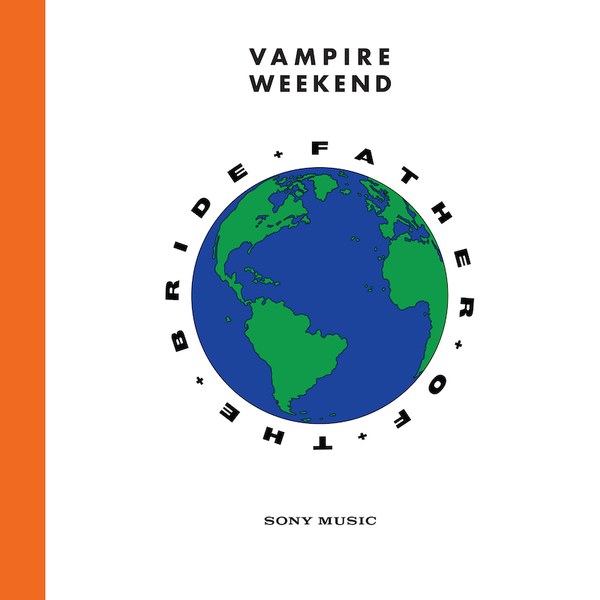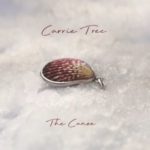‘Father of the Bride’ is Vampire Weekend’s most eclectic record to date because both their lyrics and music vary dramatically in tone. These are contributing factors as to why this lengthy album with 18-tracks avoids being stagnant, remains surprising in its genre geometry and production techniques and how they’ve evolved into multi-dimensional song-crafters that can’t be labelled in a singular way.
Although lead singer Ezra Koenig still possesses his charming and intellectual identity, long term fans will initially notice that Vampire Weekend have developed a new country edge with far more straightforward lyrics on many of their new songs on this record. This edge might not be satisfying for fans of their worldbeat-indie-rock beginning and complex lyrics but it’s interesting to hear their take on the genre. Koenig has admitted to becoming influenced by Grammy Award-winning Neo-traditional country musician Kacey Muscgraves during the group’s 6-year gap, with this being is a key reason for this decision. Koenig’s many collaborations with Danielle Haim – who contributes so much to the record that Wikipedia ought to list her as Vampire Weekend’s new fourth member – are reminiscent of the Johnny Cash and June Carter country duet style.
‘Married In A Gold Rush‘ and ‘We Belong Together’ contain country duet tropes of simplistic romantic exchanges and corny teasing conversations that are on the brink of cringe-worthy. Examples include: “Just wanna go out tonight and make my baby proud. Boy, who’s your baby? Girl, if you don’t know by now” and “We go together like left and right,” before listing other pairs of things like Fred Astaire and Ginger Rogers in ‘Let’s Call The Whole Thing Off‘.
Nonetheless, Vampire Weekend demonstrate their urge for unorthodox production among the country twang. ‘Hold You Now’ borrows a sample from Hans Zimmer’s soundtrack to the war film The Thin Red Line of a choir singing towards God in the Melanesian language (God Yu Tekem Laef Blong Mi), ‘Stranger’ has a buoyant sax with rattling vibraslap, the aforementioned ‘Married In Gold Rush’ has hypnotic bubbles bouncing in the background and there’s a gospel breeze and atmospheric animal noises on the one of the album’s weakest lyrical tracks ‘Big Blue’.
One of the best music highlights is undoubtedly upbeat piano single ‘Harmony Hall’, a sunny delight that just like the Hawaiian-sun-meets-life-disillusionment ‘This Life’ has a smile-provoking sound to contrast with its darker lyrics. ‘Harmony Hall’ touches upon common Vampire Weekend themes of wealth and mortality, as well as Koenig’s Jewish background and religion in the lines: ‘Beneath these velvet gloves I hide. The shameful, crooked hands of a moneylender. Cause I still remember.” God and religion are mentioned very frequently on the record, just like on predecessor 2013’s Modern Vampires Of The City, making it a smooth album transition. Perhaps this concept is first introduced this time by the album’s title with “father” resembling God and the globe representing religion’s world impact.
Minimalist final track ‘Jersualem, New York, Berlin’ sounds like he’s passionately empathising with the long struggle and suffering of Jewish people, discussing the history of antisemitism, analysing what it means to be Jewish and urging modern Jews not to lose faith. Maximalist ‘Sympathy’ is boisterously entertaining and intense with its unique take on flamenco music, ghostly keyboard, voice effects and pace shifts. Furthermore, it opens a discussion about the changing relationship between Jewish people and Christians over the years and how it developed from hatred towards each other to a supposedly joint animosity towards Islam.
The beginning of the track hears Steve Lacy, not the jazz saxophonist, but the bass guitarist of R&B fusion collective The Internet saying: “I take myself too serious, it’s that serious.” Atmospheric noises, sample loops and soundbites are interesting aspects of ‘Father Of The Bride’. It gives the album an essence of rawness, gives it another dimension and shows that sometimes it doesn’t take itself too seriously, although sometimes it’s a bit random and not clear on the significance of what’s been said in talk-moments and how it contributes to the track like on ‘We Belong Together’.
Yet sometimes it works. Perhaps Steve Lacy’s words on the aforementioned ‘Sympathy’ are telling us to take the track with a pinch of salt, in a similar to way how the God metaphor ‘Sunflower’ features laughing in the background behind its scat singing and classic rock sound to convey an improvised moment of impulsive jamming. ‘My Mistake’ is a surprising dinner jazz gem with a similar sombre key to Billie Holiday’s ‘Gloomy Sunday’ and like the the old timey, gramophonic ‘Rich Man’ plays with the stereo/mono depth with great trickery and detail. The former also features a watery atmospheric loop of a person talking incomprehensibly, which adds an intriguing layer to its piano performance.
Although there are many moments on the album that might not please their long-anticipating fans lyrically and musically, the benefit of a very long player is that there are also a lot moments to love. Which balances the quality out in the end. ‘Father of The Bride’ is a mostly enjoyable and well-produced spring delight, a worthy entry into Vampire Weekend’s consistently surprising and brave discography.




